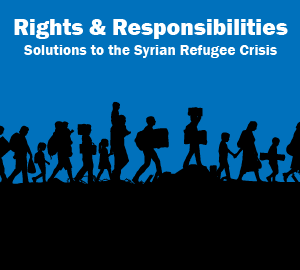 Now in its sixth year, the Syria conflict has created one of largest forced migrations since World War II, posing unparalleled humanitarian and political challenges in both the Middle East and Europe. The crisis has displaced more than half of Syria’s population, creating 5 million refugees in neighboring countries, and compelling hundreds of thousands to make perilous journeys to Europe in search of refuge and rights.
Now in its sixth year, the Syria conflict has created one of largest forced migrations since World War II, posing unparalleled humanitarian and political challenges in both the Middle East and Europe. The crisis has displaced more than half of Syria’s population, creating 5 million refugees in neighboring countries, and compelling hundreds of thousands to make perilous journeys to Europe in search of refuge and rights.
On June 14 and 15, Brookings will convene a high-level forum on the Syrian refugee crisis. This forum follows on a series of activities on the topic at Brookings, including workshops and roundtables with the United States government and international NGOs, Syrian-American community leaders, and a public event that featured Syrian refugee voices. The purpose of these activities has been to develop and propose meaningful steps that governments and nongovernmental actors can take to respond to various aspects of the crisis.
At this week’s forum, the focus will be on four concentric “circles of concern.” We plan to discuss the political, economic, social, civic, and bureaucratic limitations and opportunities in these contexts:
- Syria. This panel explores the opportunities and risks for the international community to project power to ensure civilian protection in Syria and stem the flow of refugees. The panel also examines the moral, political, and legal dimensions faced by the international community to provide greater protection and assistance to Syrian refugees.
- Front-line states. This panel explores current conditions for Syrian refugees in Lebanon, Jordan, and Turkey. The discussion focuses on the deepening need to improve international funding and development aid to these states as well as the urgent need for these states to provide refugees with access to labor markets, education, and other public goods.
- European cities. This panel discusses an underexplored dynamic of the crisis: the role that city governments, civil society, philanthropic institutions, and a full range of local actors and networks play in the reception and long-term integration of refugees. The panel will offer parallels between experiences in Germany and Sweden and what other nations, including the United States, face in resettling and integrating refugees.
- The international refugee regime. This panel examines the wider and more complex global refugee crisis. It explores the ways in which the international refugee regime can be adapted and strengthened to respond to the 60 million displaced persons whose varied and precarious conditions are the result of multiple and disparate conflicts around the world.
Our aim is to use the outcomes of these four panels to (1) elevate the political and policy discourse on the Syrian refugee crisis and (2) help shape the agendas of the upcoming United Nations General Assembly’s high-level plenary on refugees and migrants and President Obama’s summit on refugees (scheduled for September 19 and 20, respectively).
In conjunction with our forum and in an effort to generate a wider discussion, we have curated an anthology of blog posts by Brookings scholars that highlight some of the challenges and solutions to the Syrian refugee crisis. Leon Wieseltier provides a transcript from a powerful speech he delivered at a recent Syrian-American community event, in which he explores the moral and political dimensions of the Syrian crisis. Kemal Kirişci argues that Turkey and the international community must better cooperate in order to improve the lives of Syrian refugees. Matteo Garavoglia discusses new migration challenges facing Italy and how to address them. Constanze Stelzenmüller sheds light on a current debate in Germany around a new law on refugee integration. Bruce Katz and Luise Noring provide a fascinating discussion on how European cities, as opposed to nations, are grappling with a range of critical issues related to the refugee crisis, including housing, education, and integration. Kenneth M. Pollack will examine the root causes of the refugee crisis—not just the civil war in Syria but instability throughout the Middle East and Africa. Jessica Brandt sheds light on the high-stakes deal between Brussels and Ankara. Lastly, I explore the need for governments and international NGOs to engage Syrian-American community leaders for fresh and creative ideas to help Syrian refugees overseas.
We know that there are no easy solutions to this crisis. But we hope the discussions at this week’s forum and in the blog pieces that follow will help lay the groundwork for productive meetings in September and offer meaningful steps for greater shared international responsibility to protect and assist Syrian refugees.



Commentary
Rights and responsibilities: Solutions to the Syrian refugee crisis
June 13, 2016